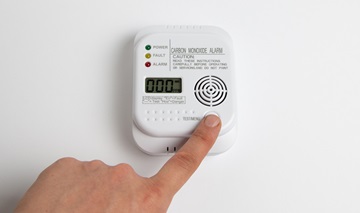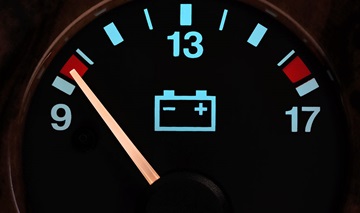Is Your Smoke Alarm Beeping? Four Things to Check First
Replace all your smoke detector batteries every six months.
To make it easy to remember, fire departments across the country suggest changing the batteries out whenever you spring forward or fall back.
If you forget, your smoke detectors will remind you at 3 a.m. with a piercing chirp.
Sometimes, after you remove the smoke alarm battery and throw it into the back of your closet under all your clothes, you can hear the smoke detector beeping.
Your smoke detectors don’t have an inside voice — for your safety.
If you hear your smoke detector beeping in brief chirps every 30-60 seconds, it’s probably time to replace the battery. Or you might need to clean out the dust, check the battery connections or replace the whole smoke alarm.
Take it from this battery expert: The smartest plan is staying ahead of it before you hear the alarm at all.
“It’s better to stay up on replacing your battery before it goes bad. Once it does, you’re going to hear the chirping,” said Kristen Luckie, store manager for Interstate All Battery Center in Euless, Texas. “If you check on them before it comes due, it’s all around better for your health and safety.”
Interstate All Battery Center locations across the country serve fire departments, connecting them to reliable fire truck batteries, radio batteries and batteries for anything else they need. When it comes to batteries for fire & security, Luckie and the team know how to make sure you have the right battery when your safety is on the line.
Most smoke detectors need a 9V battery, either a regular alkaline battery or a lithium battery. Luckie recommends the 9V lithium battery because it’s a better deal for homeowners and is one less thing to worry about.
“You replace alkalines every six months,” Luckie said. “Lithium you replace every 10 years. That’s why you want to go with a lithium.”

Team member Grant Anderson shows how easy it is to replace a smoke detector battery with a 9V lithium battery. | Photo By Kristen Luckie, Interstate All Battery Center in Euless
The lithium smoke alarm batteries tend to go in detector on high ceilings or hard-to-reach places you don’t want to climb up to every six months. When you replace a smoke detector’s battery with one that’s going to last a decade, you still should check it every six months. Fire departments across the country recommend testing smoke alarms twice a year.
Long-lasting 9V batteries are just the start.
Visit your nearest Interstate All Battery Center for AA and AAA batteries as well as custom battery solutions for whatever device you’re powering.
After all, there are a lot of reasons why your smoke detector is beeping. Let’s deal with the most likely reason first.
How to Change Batteries in Fire Alarms and Smoke Detectors
Simply open the smoke detector to replace a dead battery with a new one. The steps can vary depending on the specific model of smoke alarm you have. You may need a flathead screwdriver, a new 9V battery and a step ladder.
- Twist open the smoke detector or use your screwdriver to open the cover.
- If your smoke detector is hard-wired to the house, flip the circuit breaker before disconnecting it.
- Detach the old 9V battery from the positive and negative connections.
- Test the battery with a multimeter. (If a 9V battery is below 5.4 volts, it’s dead.)
- Replace the dead 9V battery. Make sure the connection to the new battery is tight and secure.
- Push the test button to make sure the battery powers the smoke alarm.
- Close up the smoke detector and reattach it to the wall. (If it has one, make sure the battery drawer is closed.)
Keeping your smoke detectors in good working order can save your life. According to the National Fire Protection Agency, three out of five home fire deaths happen in a house with no working smoke detectors (or even no smoke detectors at all.) Just by replacing your smoke detector batteries, you cut the chance of dying in a house fire in half. Resist the temptation to leave a smoke detector disabled.
Interstate Batteries takes home fire safety seriously. Even if smoke detectors can ruin a good night of sleep, it’s a small price to be sure your whole family is safe. The Red Cross offers more strategies to prepare your home, including a worksheet for developing a home fire escape plan. The U.S. Department of Homeland Security also offers smart home fire prevention tips at ready.gov.
Is Your Smoke Alarm Beeping After Getting a New Battery?
There’s nothing worse than replacing the battery, climbing down from the step ladder and putting all your tools away — only to hear the smoke detector chirp at you minutes later.
Troubleshooting smoke alarms can be a headache, if not an earache.
Several issues can keep your smoke detector beeping after you change the battery. If your smoke detector is still beeping, check these things instead to catch all the issues that keep your smoke detector from working properly.
1. Humidity, Dirt and High Temperatures May Make a Smoke Detector Chirp
Don’t assume it’s a false alarm. Your smoke alarm might be detecting smoke, whether you can smell it or not.
Once you’re sure you’re safe, it’s worth looking for what might have set off your smoke alarm. These devices are made to be sensitive. You can trigger a smoke alarm with enough humidity or dirt in the air. Hot steam from a shower, hot air (not smoke) from the kitchen, even extreme cold in the attic — these temperature swings can give you a false alarm. You can also trip the smoke alarm if you break drywall near it or a thick enough gust of pollen blows through an open window.
The solution is simple: Move them away from a bathroom door, away from directly above the stove and out of the drafty parts of the attic.
2. Loose or Corroded Battery Terminals May Result in Smoke Detector Beeping
Your smoke detector requires constant voltage to stay quiet. Its detection system can run on a few different options. Some use an ionization beam. Some run an electrical current through a sensor. Whatever the signal is, the principle stays the same. If that signal gets broken, well, you’ll hear all about it.
Instead of a fire or a dead battery, your smoke detector may beep because something’s interrupting it.
Are the positive and negative terminals not exactly snapped onto the 9V battery? A loose connection might pass your first test only to disconnect once you put the smoke alarm back. Detach and reattach the 9V battery firmly to its terminals.
Power up all the devices in your home with Interstate Batteries
Order our AA and AAA batteries from Amazon and get them shipped to your door.
Another problem at the terminals could be corrosion.
A layer of white or green crust and orange rust can stop the battery from doing its job. Put dry baking soda powder on the corrosion to neutralize it. Then dip a cotton swab in water and clean the metal connection. If you don’t have baking soda, you can also use WD-40 or isopropyl alcohol and a cotton swab or toothbrush to clean the terminals.
3. Fire Alarm Beeping May Be Due to Dust, Error Codes, Expiration Dates and Pull Tabs
Is your smoke detector beeping with a new battery? The problem might be the device itself.
Check the inside of your smoke detector for dust. Like your bookshelves and the top of your refrigerator, dust can build up inside the smoke detector. However, the top of your refrigerator won’t wake you at 3 a.m. if it gets too dusty. Dust particles can disrupt the sensor and cause a false alarm. To protect your sleep and keep your smoke detector working properly, use a can of compressed air to blow out dust from the detector’s components.
You may also need to clean out the error codes inside your smoke detector’s memory. Hard-wired smoke detection systems can build up error codes in their processors, even from false alarms; and those can cause the chirping noise. Check the device for a reset button to press. You can also power it down to reset it.
- Cut power from the circuit breaker.
- Unplug it from the wall.
- Remove the battery.
- Hold down the test button to drain the power out of the smoke detector’s circuits.
- Then reconnect the power.
If you replaced the battery and it’s still beeping, the smoke detector might have expired like milk. Smoke detectors have an expiration date. The sensitive equipment inside can only work reliably for so long, so if yours is beeping and its expiration date has passed (or will in a year or two), it’s time to replace it. Most smoke detectors last 10 years, and the National Fire Protection Association recommends you replace them every decade. You may need to replace it sooner if it has a built-in carbon monoxide detector.
A 9V battery from the same team powering NASCAR champions? Yes, please!
The same battery expertise on the race track goes into every 9V, AAA and AA at Interstate All Battery Center. Try them for yourself.
On the other hand, your smoke alarm might be going off because it’s so new that it still has a pull tab blocking the battery terminals. Most new electronics may have a plastic tab to protect the device’s terminals from connecting with anything before purchase. A smoke alarm battery pull tab blocks the battery from connecting with the circuit — and all you have to do is pull it out.

Pro Tip: Cut the Power Before You Disconnect a Hardwired Smoke Detector
Is your smoke detector hardwired to the house? Then flip the circuit breaker to that part of the house before you change its battery.
It’s a common question: Do I still need to replace the battery if my smoke-alarm is hardwired to the house? Yes. Hardwired smoke detectors have a backup 9V battery in case of a power outage.
The hardwired detectors also communicate to each other. If the kitchen smoke detector picks up an alarm, the detector in the second-floor hallway will also go off. (A single, battery-powered smoke alarm works alone.)
So which circuit breaker runs your hardwired smoke alarms? All of them. Home builders must connect these alarms to other electrical circuits, so you don’t accidentally disable them all with the flick of a switch.
Get smoke detector batteries automatically delivered twice a year to keep the beeping and chirping away
Let Amazon’s auto-ordering remind you to replace your 9V smoke detector batteries twice a year.
Watch the fire alarm’s power lights as you flip circuits in that room. When the light goes off, you found the right circuit and you’re free to disconnect it from the ceiling or wall.
The Meaning of Smoke Detector Beeping and Chirping Patterns
Smoke alarms are great at getting your attention. What is it actually saying?
If you haven’t tested your smoke alarm in a while, you might not recognize the difference between beep-beep-beep and chirp-pause-chirp. There are three main signal types you’ll hear from your smoke detectors although the specific sounds and alerts can vary among models. Be sure to check your owner’s manual for your smoke alarms.
- Beep-Beep-Beep: The Warning Alarm. Three strong beeps in a row are telling you that the alarm detects smoke. Yes, this is also the noise when the turkey is very, very done — but don’t let false alarms or minor hazards trick you. The warning alarm could be a sign that a fire has started, and you need to act.
- Chirp-Chirp-Pause: The Fault Alert. Your smoke detector may be able to tell the difference between a housefire and a malfunction. The newer the model, the more likely you are to hear a series of chirps (two or four to avoid confusion with the fire alarm) if it knows something is bothering its sensor. When you hear this, attend to the smoke detector so it works properly.
- One Beep, Long Pause: Low Battery. Time to change your smoke detector battery. This signal may also mean a generic fault alert, meaning dust or dirt are blocking its sensors, the detector itself needs to be replaced or you need a battery. We know a few places where you can get an Outrageously Dependable® battery for your smoke alarm.
Need more than a 9V for your alarm system? We got you.
Visit your nearest Interstate All Battery Center for alarm system batteries, backup batteries and more — plus the Pros on-hand to help you install them.




